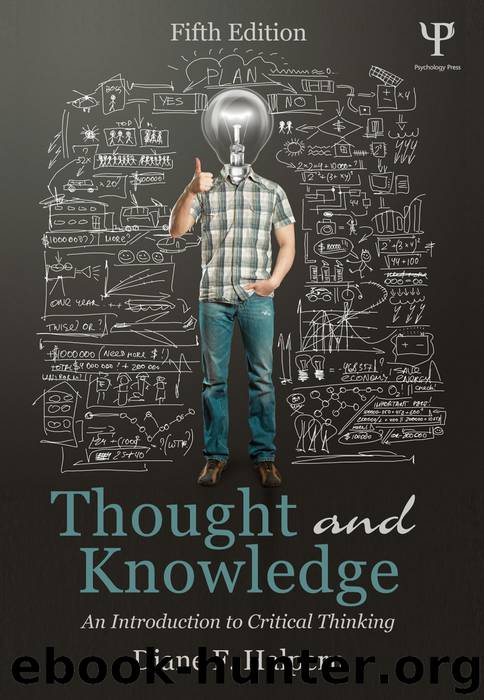Thought and Knowledge by Halpern Diane F

Author:Halpern, Diane F.
Language: eng
Format: epub
ISBN: 978-1-134-63793-5
Publisher: Taylor and Francis
Thinking about Errors
To a scientist a theory is something to be tested. He seeks not to defend his beliefs, but to improve them. He is, above everything else, an expert at changing his mind.
—Wendell Johnson, p. 39 (1946)
When we try to understand relationships by devising and testing hypotheses, we will sometimes be wrong. This idea is expanded on more fully in the next chapter, which concerns understanding probabilities. For now, consider this possibility: Suppose that you drive into work every day with a friend. Every morning you stop at a drive-through window and buy coffee. You decide that, instead of hassling every morning with who will pay (“I’ll get it—No, no let me”), he will flip a coin. When the outcome is heads, he will pay; when the outcome is tails, you will pay. Sounds fair enough, but on nine of the last ten days, the coin landed with tails up. Do you think that your friend is cheating?
The truth is that your friend is either cheating or he is not cheating. Unfortunately, you don’t know which is true. Nevertheless, you need to make a decision. You will decide either that he is cheating or he is not cheating. Thus, there are four possibilities: (1) He is cheating, and you correctly decide that he is cheating; (2) He is not cheating, and you correctly decide that he is not cheating; (3) He is cheating, and you incorrectly decide that he is not cheating; and (4) He is not cheating, and you incorrectly decide that he is cheating. With these four possibilities, there are two ways that you can be right and two ways that you can be wrong. These four combinations are shown in Table 6.1.
As you can see from Table 6.1, there are two different ways that we can make errors in any hypothesis-testing situation. These two different errors are not equally “bad.” It is far worse to decide that your friend is cheating when he is not (especially if you accuse him of cheating) than it is to decide that he is not cheating when he is. Thus, you would want stronger evidence to decide that he is cheating than you would want to decide that he is not cheating. In other words, you need to consider the relative “badness” of different errors when testing hypotheses.
If you take a course in statistics or experimental design, you’ll find that the idea of error “badness” is handled by requiring different levels of confidence for different decisions. The need to consider different types of errors is found in many contexts. A basic principle of our legal system is that we have to be very certain that someone has committed a crime (beyond a reasonable doubt) before we can convict her. By contrast, we do not have to be convinced beyond a reasonable doubt that she is innocent because wrongly deciding that someone is innocent is considered a less severe error than wrongly deciding that someone is guilty. Similarly, when you are
Download
This site does not store any files on its server. We only index and link to content provided by other sites. Please contact the content providers to delete copyright contents if any and email us, we'll remove relevant links or contents immediately.
| Administration & Medicine Economics | Allied Health Professions |
| Basic Sciences | Dentistry |
| History | Medical Informatics |
| Medicine | Nursing |
| Pharmacology | Psychology |
| Research | Veterinary Medicine |
The Art of Thinking Clearly by Rolf Dobelli(10399)
The 5 Love Languages: The Secret to Love That Lasts by Gary Chapman(9766)
Mindhunter: Inside the FBI's Elite Serial Crime Unit by John E. Douglas & Mark Olshaker(9305)
Becoming Supernatural by Dr. Joe Dispenza(8190)
Nudge - Improving Decisions about Health, Wealth, and Happiness by Thaler Sunstein(7684)
The Road Less Traveled by M. Scott Peck(7578)
Mastermind: How to Think Like Sherlock Holmes by Maria Konnikova(7309)
Enlightenment Now: The Case for Reason, Science, Humanism, and Progress by Steven Pinker(7300)
Win Bigly by Scott Adams(7178)
The Way of Zen by Alan W. Watts(6584)
Factfulness: Ten Reasons We're Wrong About the World – and Why Things Are Better Than You Think by Hans Rosling(4727)
The State of Affairs by Esther Perel(4707)
Gerald's Game by Stephen King(4630)
Man's Search for Meaning by Viktor Frankl(4561)
The Confidence Code by Katty Kay(4240)
Thinking in Bets by Annie Duke(4210)
The Healing Self by Deepak Chopra(3562)
Hidden Persuasion: 33 psychological influence techniques in advertising by Marc Andrews & Matthijs van Leeuwen & Rick van Baaren(3538)
The Worm at the Core by Sheldon Solomon(3474)
